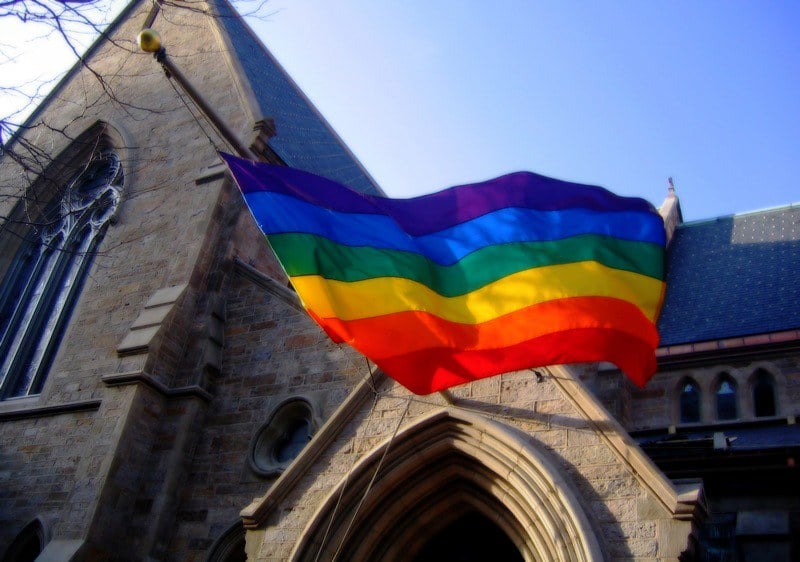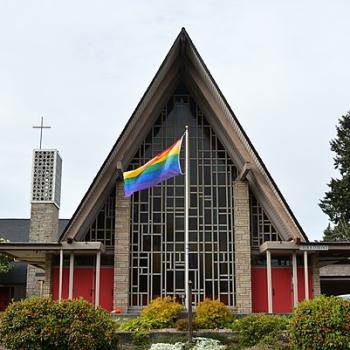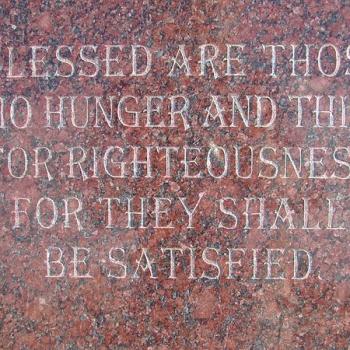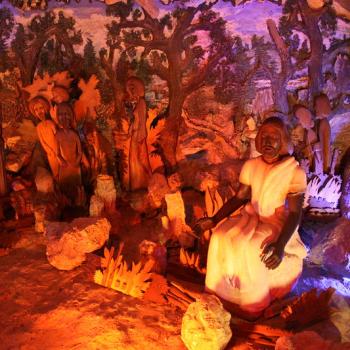
What Is Progressive Christianity?
By definition, progressive Christianity is always evolving and therefore impossible to pin down. If you ask a room full of progressive Christians what progressive Christianity means to us, you will get as many different answers as there are people.
Yet you can find common principles shared among most progressive Christians, including myself. These include openness to learning, appreciation for the diversity of world religions and interfaith dialogue, and passion for social justice. The Center for Progressive Christianity (TCPC), a major network of progressive churches, ministers, and lay leaders, has articulated several identifying factors of progressive Christianity.
Progressive Christians, TCPC maintains, are Christians who allow our understanding of Christianity to evolve according to scientific and Biblical scholarship. I embrace this characterization. Following Jesus necessarily means continuing to open our minds and hearts to deeper levels of intellectual and spiritual understanding.
Previously, TCPC summarized the commitment to intellectual and spiritual growth, compassion, inclusion, and justice in what were called the 8 Points of Progressive Christianity. But while the principles have held firm, the language has progressed. The 8 Points are now 5 Core Values.
TCPC requests that these values be held “lightly but seriously,” not as dogma but as beginnings for dialogue. They are launching pads for the Holy Spirit to send us into ever-opening realms of compassion, understanding, and empathy. So as I reflect on each value, I invite you to do the same. Let’s explore together and see where the Spirit leads us.
Christians who embrace the descriptor “progressive,” TCPC maintains, are those who
(1) Believe that following the way and teachings of Jesus can lead to experiencing sacredness, wholeness, and unity of all life, even as we recognize that the Spirit moves in beneficial ways in many faith traditions.
I wholeheartedly embrace this.
Christians believe that God became flesh in Jesus Christ. Therefore, Jesus is the center of the Christian faith for those who embrace the label “progressive” and those who do not.
But whereas creeds and traditional Christianity focus on Jesus’ death and resurrection, Christians who embrace the label “progressive” place equal or greater emphasis on his life and teachings. We acknowledge that his death and resurrection are important. Jesus’ death reveals that when we condemn and kill others, we condemn and kill God in flesh. The resurrection reveals God’s infinite forgiveness. But it is in following Jesus’ example — his solidarity with the poor, marginalized, and condemned — that God heals us and empowers us to heal the world.
God is Love, and Jesus is Love enfleshed. For me, Love communicates most clearly in embodied form. Jesus shows us how to use our heads, hearts, and hands to build the Beloved Community. We follow Jesus’ example to live in active, transformative love.
Yet all faiths are Love languages. I agree that “the Spirit moves in beneficial ways in many faith traditions.” Love has moved through the world from the beginning, carried in every heart, uniting all creation. Whenever and wherever people have come through suspicion into trust, conflict into cooperation, ignorance into understanding, and enmity into empathy, Love has guided. Love finds expression in every faith, even as human limitation also finds expression in every religion.
When Jesus says “No one comes to the Father except through me,” I take that to mean that no one can come to Love without embodying love. We commune with Love by loving others, no matter how we label ourselves. And we learn how to love one another better by listening to and honoring each other’s faiths, perspectives, and worldviews.
(2) Seek community that is inclusive of all people, honoring differences in theological perspective, age, race, sexual orientation, gender identity/expression, class, or ability.
We are interconnected by and in Love, which binds and sustains us all. Therefore we seek to find and build community that reflects our interconnection.
Building community means breaking down barriers: physical, psychological, economic, and spiritual. Breaking barriers is not about erasing difference but embracing difference. It’s about refusing to let differences isolate us into homogeneous silos that stifle learning and growth.
Breaking down barriers requires real solidarity. It requires centering the needs and dignity of the most marginalized, for they too often are sacrificed in quests for power and profit. It requires particularly those of us with privilege to open our eyes to the ways our behaviors and unconscious biases may hurt others. Racism, sexism, classism, queerphobia, ableism and religious bigotry all require active struggle to overcome and transform. That struggle starts with the recognition that our well-being is tied together. I cannot be all I am meant to be until you are all you are meant to be.
But what about those who do not value inclusion, who harbor exclusive beliefs or religious interpretations? Beloved Community begins with the marginalized and vulnerable, those traditionally excluded and exploited. Thus, those who would exclude others ultimately exclude themselves.
Even so, by working for the needs and well-being of all, starting with the marginalized and radiating outward, we deepen the love within ourselves and reach out to the love within others. We can express agreement where it exists, hold firm to our values when others challenge them, and show compassion overall. Eventually, compassion wears down callousness and empathy erodes enmity. This is how we move from rivalry to relationship, exclusion to embrace.
(3) Strive for peace and justice among all people, knowing that behaving with compassion and selfless love toward one another is the fullest expression of what we believe.
Amen.
It is fitting that this value follows on the heels of the previous one. Building all-inclusive community and striving for peace and justice go hand-in-hand.
Peace can never be built on exclusion. It can never be built by distinguishing between “us” and “them” and building walls or firing guns or launching missiles to exclude and destroy the “other.”
True worship is all about building peace by growing in love for one another. We honor our parents by loving our siblings. As children of Love, we can only honor Love by loving one another.
But in a world of violence and enmity, protecting those we love is too often conflated with fighting those we hate or believe hate us. Time, resources, and energy are invested in weapons instead of well-being. It’s hard to imagine a world so infused with compassion and respect that we consider the needs of neighbors across the globe, let alone across the street.
Peacemaking is vital and urgent.
Striving for peace takes humility. It takes repentance and turning around from an over-against mindset. It takes recognizing that we are not here to get ahead; we are here to get together. It takes sharing our resources and sacrificing some of our comforts so that everyone has enough. It takes finding our greatest comfort in recognizing that our joy is bound up together. The well-being of all humanity is the well-being of each individual.
Imagine all the people sharing all the world. That’s exactly what it means to live into who we truly are as reflections of Love and build Beloved Community on earth as in heaven.
(4) Embrace the insights of contemporary science and strive to protect the Earth and ensure its integrity and sustainability.
I embrace this tenet, but with a caveat.
Embracing science is vital. Yet many people of faith struggle to reconcile perceived incompatibilities between faith and science where ancient understanding contradicts scientific discovery. I’ve waged this struggle and empathize with it. My interpretation of faith now rejects literalism and acknowledges that ancient story-telling was not designed to fulfill the same purpose as scientific inquiry.
Scripture is a mixture of human understanding and misunderstanding as well as divine revelation. It’s not divine dictation, but a human journey into understanding who God is and who we are meant to be. This interpretative lens has allowed me to embrace scientific discovery and modify my theology when necessary. A hermeneutic that allows scientific discovery to inform our compassion toward creation enhances rather than diminishes faith.
Rejecting science means forfeiting our call to be caretakers of the earth and each other. We cannot care for creation if we deny global warming. We hinder our ability to look out for the well-being of one another if we don’t listen to doctors and epidemiologists. Scientific insight harnessed toward compassionate living is the only way our world will survive and heal.
My caveat is this: embracing science necessarily involves skepticism and questioning. Our understanding of science is often mediated through narratives that are politicized or used to enhance corporate profit. Embracing science necessarily means scrutinizing narrative. And our questions should be guided by compassion and love for all.
Science has built tools of destruction even as it remains our hope for rejuvenation. Science has sacrificed the vulnerable even as it holds the potential to expand care for the vulnerable. Unless our compassion keeps pace with science, we will end up with what Martin Luther King has called “guided missiles and misguided men.”
(5) Commit to a path of life-long learning, believing that there is more value in questioning than in absolutes.
I anchor myself in two absolutes that open me to life-long seeking.
- God is Love.
- Love redeems and reconciles us all.
Within these absolutes, I am able to move through fears and doubts as I strive to learn, grow, understand, help, and love.
I believe people seek certainty and absolutes out of a desire for security and belonging with others who hold like beliefs. A life-long path of learning can be lonely, as faith journeys veer in different directions. Your path may not always align or be parallel to another’s.
It comforts me to know that we are held in Love’s embrace no matter where our journeys lead us. Our faith journeys with our loved ones may diverge only to reunite later. And, of course, since we are anchored in Love, we need not part from our friends and family even if we change places or methods of worship.
Knowing that we belong in Love and are held in Love on our journeys, committing to life-long learning becomes more exciting than scary. Whereas I once felt like I was finding myself by finding answers, I now realize that I cannot lose myself by questioning those answers. We live into who we are meant to be by continuing to question.
Our lives are labyrinthine journeys. We approach recurring themes from different angles. We travel deeper into our understandings, and sometimes we find it necessary to step back and gain new perspectives. Love ignites our desire to keep questioning and searching so that we may better understand, serve, and love each other.
Faithfulness is trusting the voice of Love within us that keeps us seeking understanding, knowing that the journey never ends.
What do you think?
I embrace the five core values of progressive Christianity not to distinguish myself from other Christians, but as a path to connection with all people, all creation, and the Love that sustains us.
And speaking of connection, I would love to hear from you! How do you interpret these values? Do you embrace any or all of them? Is there anything you would add or change?
We’re all on a journey of life and faith. So let’s progress forward in dialogue and build up the Beloved Community together!
You can share your perspective here or find me on Facebook.
Image: “Rainbow at Half Mast” by Brian Talbot. Image available on Flickr via Creative Commons Attribution Non-Commercial 2.0 Generic license.
















